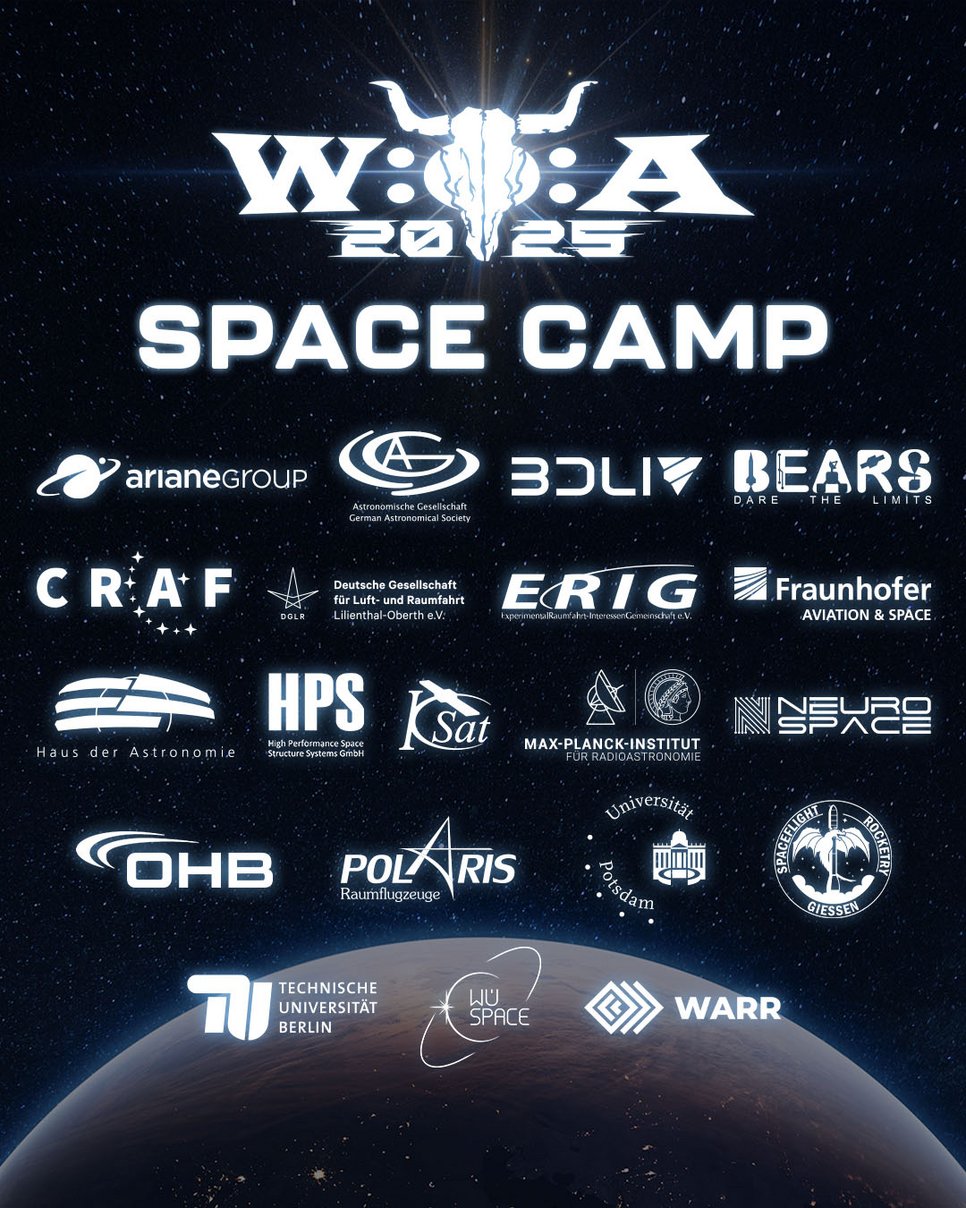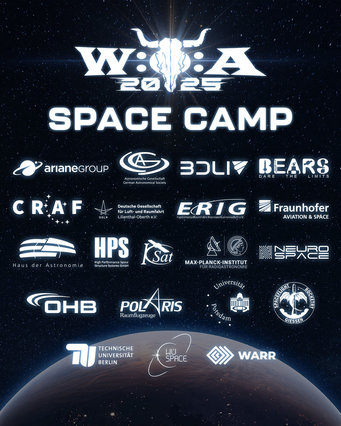Space up close at Wacken Open Air 2025
At the end of July, Wacken will be reaching for the stars: Wacken Open Air is bringing numerous players from the German space and astronomy cuommunity to the holy ground – including astronauts. As part of a special collaboration, visitors can look forward to a space camp with an exciting and informative program on all things space. Partners include ArianeGroup, the German Astronomical Society (represented by the Max Planck Institute for Radio Astronomy in Bonn, the House of Astronomy in Heidelberg, and the Institute of Physics and Astronomy at the University of Potsdam), the German Aerospace Center (DLR), CRAF, the German Aerospace Society (DGLR), Fraunhofer AVIATION & SPACE, HPS, Hylmpulse, NEUROSPACE, OHB, and POLARIS Spaceplanes. A special highlight will be the visit of astronauts Alexander Gerst and Rabea Rogge to Wacken Open Air.

Rockets, rovers, stars, and satellites: In addition to large-scale exhibits such as a replica of the European Ariane 6 launcher, a suborbital rocket from HyImpulse, a moon balloon from OHB, and a prototype of the MIRA 1 space plane from POLARIS Spaceplanes, there is much to discover at the Space Camp at Wacken Open Air. These include the HiveR moon rover from NEUROSPACE, a model of the Fraunhofer Earth observation satellite ERNST, and a mock-up of the ADEO deorbit sail for preventing space debris from HPS. Two-time ESA astronaut Alexander Gerst and the first German woman in space, Rabea Rogge, will land on the stage at Wacken Open Air on 30 July and 1 August 2025, respectively.
But there's even more in store for metalheads between 27 July and 2 August 2025: In the exhibition tent, visitors can learn about a wide range of topics such as astronomy, light pollution, and space technology. The BDLI, DGLR, Fraunhofer AVIATION & SPACE, HPS, the German Astronomical Society, and OHB will all have booths there. Interactive elements invite metalheads to try their hand at driving moon rovers, interactive games for observing the Earth, and water rockets, which are being implemented by six groups of young students and the Department of Space Technology (RFT) at the Technical University of Berlin (made possible by the DGLR).
In the lecture tent, the Space Camp offers a top-tier program of exciting talks compiled by experts from the industry. Participants can get a taste of astronomical topics, satellite missions, or even current challenges such as sustainability in space: “Heavy metals in space – how gold is formed”, “Saving the night – how important darkness is for humans, the environment, and astronomy”, and much more. Anyone who wants to get involved after these exciting impulses can also find out more about space-related careers at Space Camp. Daily highlights include an Ask the Scientist and Ask the Industry format, as well as an evening Space Pub Quiz.
Prof. Dr. Stefanie Walch-Gassner, President of the German Astronomical Society, notes: “When we look up at the night sky, we don't just see stars – we see questions, dreams and the infinite curiosity that drives us to understand the universe. Stars are not just points of light – they are invitations to think bigger.”
“In the Eifel region, we have a huge piece of heavy metal – the 100-meter Effelsberg radio telescope. Unlike most metalheads, our ear canals are still extremely sensitive. However, this also causes problems, because our measurements are very often disrupted by man-made radio transmissions,” says Dr. Benjamin Winkel from the Max Planck Institute for Radio Astronomy (MPIfR).
"We like the sky to be black. That way, we can see to the end of space with our equipment. But in most places, it's much too bright at night. That's not just bad for a few specialists, but for all living things. We show you how important darkness is and call on you to stand up for darkness and fight for it," explains Dr. Gyula I. G. Józsa from the MPIfR and chair of the expert group on the impact of satellite constellations in the German Astronomical Society.
About Wacken Open Air
Wacken Open Air is the largest heavy metal festival in the world. Starting with 800 visitors in 1990, today 85,000 fans from all over the world make the pilgrimage to Wacken in Schleswig-Holstein, turning the community of 2000 souls into the center of the festival scene for several days. The organizer, WOA Festival GmbH, has a broad network that includes band management, the Wacken Foundation, tour booking, music publishing, travel and accommodation, merchandising distribution, and ticketing. In cooperation with partners, this network constantly produces creative solutions and ideas that revolutionize the festival experience, enable technical innovations, and produce extraordinary event concepts. Wacken Open Air 2025 will take place from July 30 to August 2, 2025. https://www.wacken.com
Partner
The Committee on Radio Astronomy Frequencies (CRAF) of the European Science Foundation (ESF): CRAF is an expert committee under the umbrella of the European Science Foundation. For almost 40 years, it has been working to protect radio astronomy, geodesy, and other scientific radio services from man-made interference. Similar to light pollution in optical astronomy, emissions from our modern civilization (mobile phone networks, parking aids, navigation systems, etc.) can severely impair the highly sensitive measurements of scientists.
The German Astronomical Society (AG) is the professional association for German astronomy and astrophysics and promotes activities in science and research. A central body of the AG is the Rat Deutscher Sternwarten, which is composed of astronomical research institutions and is represented at the Space Camp by three member institutions:
The Max Planck Institute for Radio Astronomy in Bonn, which studies radio waves emitted by astronomical objects. These include pulsars – rapidly rotating neutron stars – and black holes. The aim is to test the general theory of relativity, detect gravitational waves, and answer questions about the formation of galaxies.
Haus der Astronomie, a center for astronomical education and public outreach on the grounds and under the administration of the Max Planck Institute for Astronomy in Heidelberg, with the aim of bringing astronomy to the general public and schools and promoting exchange among researchers.
The Institute of Physics and Astronomy at the University of Potsdam, whose astrophysical research fields range from the observation and modeling of stars and planets in our Milky Way to the understanding of dark matter, the study of galaxy evolution, and the mapping of the observable universe.
